

Beware of frauds: Online appointments are available only after confirmation with the hospital for any of our consultant doctors.


Gallstones are a common condition affecting millions of people worldwide, with the prevalence rising steadily, particularly in developed countries. The number of people living with gallstones has surged over the years, and in many cases, surgery is often advised as the primary treatment. However, many patients are asking whether gallstones can be removed without surgery. This question is fundamental as patients seek less invasive methods to manage their condition, avoid long recovery times, and preserve the health of their gallbladder.
In this blog, we will explore non-surgical treatment options available for gallstones and discuss their effectiveness in removing stones and managing symptoms.
Gallstones are hardened deposits of bile in the gallbladder, a small organ located just below the liver. These stones can differ in size, ranging from tiny grains to large, golf ball-sized formations. They are typically made up of cholesterol or bile pigments, and in some cases, a combination of both. While many people with gallstones experience no symptoms, some individuals develop painful conditions due to the obstruction of bile flow, leading to the need for treatment.
Although some people may not experience any symptoms, those who do often report the following:
When these symptoms occur, it’s essential to seek medical advice to prevent further complications like pancreatitis or gallbladder inflammation.
Traditionally, the standard treatment for gallstones has been surgical removal of the gallbladder via a procedure called cholecystectomy. However, many individuals are exploring non-surgical treatment options. Below, we’ll discuss the available alternatives to surgery for gallstone management.
One of the most commonly discussed non-surgical options for treating gallstones is medication. Ursodeoxycholic acid (ursodiol) is an FDA-approved medication that can help dissolve certain types of gallstones, specifically cholesterol stones.
How it Works:
Ursodiol works by lowering he amount of cholesterol in bile, making it easier for the body to dissolve the cholesterol-based stones over time. However, this method is typically slow and may take months to years for significant results. It is most effective for smaller stones and in patients who cannot undergo surgery for other reasons.
Limitations and Side Effects:
While ursodiol is effective for certain types of stones, it does not work for pigment stones or large stones. Additionally, it may not be suitable for everyone, and some people may experience side effects like diarrhoea, abdominal pain, or liver enzyme abnormalities.
Extracorporeal Shock Wave Lithotripsy (ESWL) is a non-invasive procedure that uses sound waves to break gallstones into smaller pieces. Once the stones are fragmented, they can pass through the bile ducts and be excreted naturally.
How it Works:
ESWL is a relatively quick procedure that involves directing high-energy shock waves at the gallstones from outside the body. This technique is typically used in conjunction with other treatments to break up larger stones.
Effectiveness:
Although effective for certain types of stones, ESWL is usually used only when the stones are small and positioned in a way that allows them to be fragmented easily. It may not be effective for large or very hard stones. Furthermore, there is a risk that broken pieces of the stone could block the bile ducts, potentially leading to complications.
For some individuals, gallstones may not require treatment if they are small and not causing any symptoms. In such cases, lifestyle and dietary changes can help manage symptoms and prevent new stones from forming.
Recommended Dietary Changes:
Although not scientifically proven, some people turn to alternative remedies for gallstones, including herbal treatments. Herbs like milk thistle, dandelion root, and turmeric are often used to promote liver and gallbladder health. While these remedies may provide some benefit in terms of detoxification, they should not be considered a replacement for professional medical treatment.
Caution:
Before using any herbal supplements or alternative therapies, it’s important to consult with a healthcare provider, as some herbs may interact with medications or cause adverse effects.
In some cases, if gallstones are small and not causing symptoms, a doctor may suggest a watchful waiting approach. This involves monitoring the condition with regular check-ups and imaging, without immediate treatment.
Treatment may become necessary if gallstones cause pain, infection, or blockages in the bile ducts, leading to more serious complications, such as pancreatitis or cholecystitis (inflammation of the gallbladder).
Although non-surgical treatments are available, in many cases, surgery remains the most efficacious way to treat gallstones. If non-surgical treatments fail or if complications arise, gallbladder removal surgery (cholecystectomy) may be recommended. This procedure is generally safe and effective, and it can be done through minimally invasive laparoscopic techniques, allowing for quicker recovery and less scarring.
While it may not always be possible to prevent gallstones, lifestyle changes can significantly reduce the risk. Maintaining a healthy weight, following a balanced diet, exercising regularly, and managing cholesterol levels can all contribute to better gallbladder health and reduce the likelihood of gallstone formation.
Gallstones can be a painful and disruptive condition, but they don't always require surgery. Non-surgical options, such as medication, shockwave lithotripsy, and dietary changes, can help manage or even remove gallstones in some cases. If you’re experiencing symptoms or suspect you have gallstones, it's essential to consult a healthcare professional to determine the best course of action for your specific situation.
If you're experiencing symptoms of gallstones or have concerns about your gallbladder health, consult with Dr Anubhav Singh at Krishna Medical Centre in Lucknow today. He offers comprehensive diagnostic services and personalised treatment plans tailored to your needs. Book your appointment now!